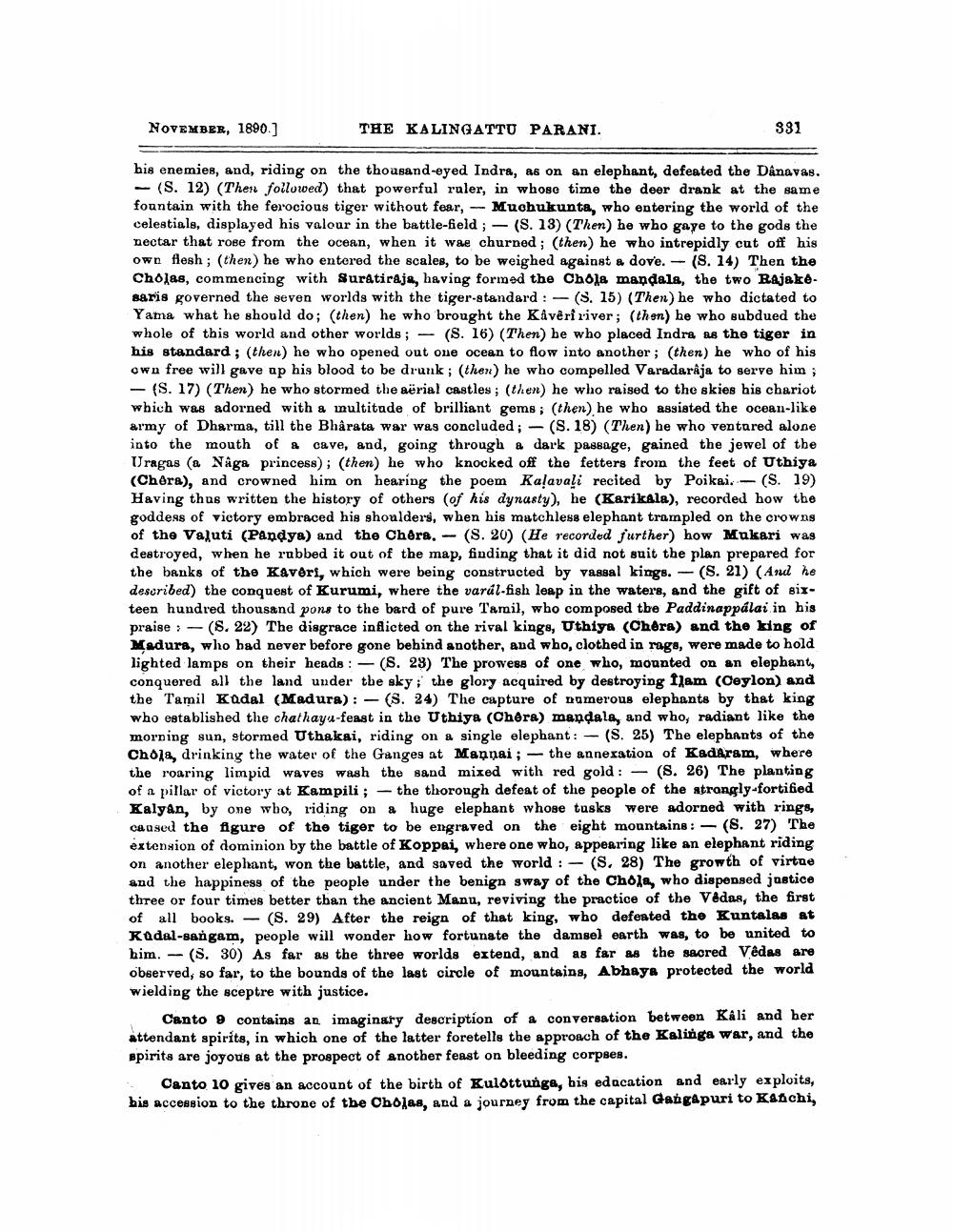________________
NOVEMBER, 1890.]
—
his enemies, and, riding on the thousand-eyed Indra, as on an elephant, defeated the Dânavas. (S. 12) (Then followed) that powerful ruler, in whose time the deer drank at the same fountain with the ferocious tiger without fear, -Muchukunta, who entering the world of the celestials, displayed his valour in the battle-field; (S. 13) (Then) he who gaye to the gods the nectar that rose from the ocean, when it wae churned; (then) he who intrepidly cut off his own flesh; (then) he who entered the scales, to be weighed against a dove. (S. 14) Then the Cholas, commencing with Surâtiraja, having formed the Chola mandala, the two Rajakesaris governed the seven worlds with the tiger-standard: (S. 15) (Then) he who dictated to Yama what he should do; (then) he who brought the Kâvêrî river; (then) he who subdued the whole of this world and other worlds; - (S. 16) (Then) he who placed Indra as the tiger in his standard; (then) he who opened out one ocean to flow into another; (then) he who of his own free will gave up his blood to be drunk; (then) he who compelled Varadaraja to serve him ; - (S. 17) (Then) he who stormed the aërial castles; (then) he who raised to the skies his chariot which was adorned with a multitude of brilliant gems; (then) he who assisted the ocean-like army of Dharma, till the Bharata war was concluded; - (S. 18) (Then) he who ventured alone into the mouth of a cave, and, going through a dark passage, gained the jewel of the Uragas (a Naga princess); (then) he who knocked off the fetters from the feet of Uthiya (Chêra), and crowned him on hearing the poem Kalavali recited by Poikai. - (S. 19) Having thus written the history of others (of his dynasty), he (Karikala), recorded how the goddess of victory embraced his shoulders, when his matchless elephant trampled on the crowns of the Valuti (Pandya) and the Chêra. (S. 20) (He recorded further) how Mukari was destroyed, when he rubbed it out of the map, finding that it did not suit the plan prepared for the banks of the Kaveri, which were being constructed by vassal kings. (S. 21) (And he described) the conquest of Kurumi, where the varúl-fish leap in the waters, and the gift of sixteen hundred thousand pons to the bard of pure Tamil, who composed the Paddinappálai in his praise (S. 22) The disgrace inflicted on the rival kings, Uthiya (Chera) and the king of Madura, who had never before gone behind another, and who, clothed in rags, were made to hold lighted lamps on their heads: (S. 23) The prowess of one who, mounted on an elephant, conquered all the land under the sky; the glory acquired by destroying flam (Ceylon) and the Tamil Kadal (Madura): (S. 24) The capture of numerous elephants by that king who established the chathayu-feast in the Uthiya (Chêra) mandala, and who, radiant like the morning sun, stormed Uthakai, riding on a single elephant: (S. 25) The elephants of the Chola, drinking the water of the Ganges at Mannai; - the annexation of Kadaram, where the roaring limpid waves wash the sand mixed with red gold: (S. 26) The planting of a pillar of victory at Kampili; - the thorough defeat of the people of the strongly-fortified Kalyan, by one who, riding on a huge elephant whose tusks were adorned with rings, caused the figure of the tiger to be engraved on the eight mountains: (S. 27) The extension of dominion by the battle of Koppai, where one who, appearing like an elephant riding on another elephant, won the battle, and saved the world: - (S. 28) The growth of virtue and the happiness of the people under the benign sway of the Chola, who dispensed justice three or four times better than the ancient Manu, reviving the practice of the Vedas, the first of all books. (S. 29) After the reign of that king, who defeated the Kuntalas at Kadal-sangam, people will wonder how fortunate the damsel earth was, to be united to him. (S. 30) As far as the three worlds extend, and as far as the sacred Vêdas are observed, so far, to the bounds of the last circle of mountains, Abhaya protected the world wielding the sceptre with justice.
—
THE KALINGATTU PARANI.
:
-
-
—
-
831
-
Canto 9 contains an imaginary description of a conversation between Kâli and her attendant spirits, in which one of the latter foretells the approach of the Kalinga war, and the spirits are joyous at the prospect of another feast on bleeding corpses.
Canto 10 gives an account of the birth of Kulottunga, his education and early exploits, his accession to the throne of the Cholas, and a journey from the capital Gangapuri to Kanchi,




